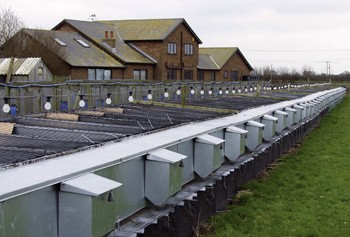Shooting groups say DEFRAs game bird code ‘unworkable’

Shooting groups say DEFRA’s game bird code ‘unworkable’.
The British Association for Shooting and Conservation was alone among shooting groups last week in welcoming the eventual publication of DEFRA’s new game bird code.
Other groups, including the Game & Wildlife Conservation Trust and the Game Farmers’ Association (GFA), heavily criticised the final version of the code laid before Parliament on Monday, 15 March.
The GFA and others have called for the code to be withdrawn until concerns over its content are resolved. In the code that appeared last week DEFRA has inserted extra clauses restricting catching up and bitting as well as a new requirement to check birds at least twice a day – including in the release pen.
None of these extra clauses was consulted on prior to the code’s publication.
Additionally, the code effectively bans the use of existing raised laying cages for pheasants and specifies arbitrary minimum space requirements for pheasants and partridges kept for egg production. If the code is not revised, it will come into force in England on 1 October.
Welcoming the publication of the code, especially the implementation of minimum space requirements for those using raised laying cages to produce partridge and pheasant eggs, BASC’s director of communications, Christopher Graffius, said: “The government and particularly DEFRA ministers are to be congratulated on reaching a decision which ensures the future of game shooting and high standards of animal welfare.”
In contrast, the Game & Wildlife Conservation Trust’s head of wildlife disease and epidemiology, Chris Davis, was sharply critical of DEFRA: “The published code now laid before Parliament deviates from the draft in important and practical ways. We believe some of the alterations are sheer nonsense, some onerous, whilst none seem to have scientific merit and even contradict expert opinion. The inclusion of specific space allowances goes against advice from the Farm Animal Welfare Council and is not based on research.”
He added: “This should have been a document leading the way in game bird welfare. Instead, it is being rejected by the very people who have game bird welfare at the centre of their business. This document should be redrafted to address these concerns and regain the consensus in order to safeguard game bird welfare.”
The National Gamekeeper’s Organisation expressed particular concern over the new requirement, it says makes the catching-up of wild birds to enhance a breeding flock practically impossible.
“The code says we cannot mix incoming birds with others we already hold for the entire breeding season,” said NGO chairman, Lindsay Waddell.
“Well just how are the birds supposed to mate?”
BASC, however, is adamant the restriction is not a problem for shoots, advising that: “Caught-up birds should be kept separate from an existing flock for one breeding season. Sentinel birds from an existing flock should be mixed in with the new birds. The new birds can be used for breeding but must be kept separately from the existing closed flock. They can be added into the closed flock after their period of segregation.”
The Countryside Alliance’s campaigns director, Robert Gray, said: “Egg production will be exported to non-UK producers using systems with far lower welfare standards than those which would have been enforced in England under a sensible code of practice.”
“The DEFRA minister responsible, Jim Fitzpatrick, has left a raft of problems on the desk of his successor.”
Separately, BASC last week sought support for its position, canvassing game farmers around the country. However, at the GFA’s recent annual general meeting no members, when asked directly, were opposed to the industry body’s stance supporting the use of enriched raised laying cages.








